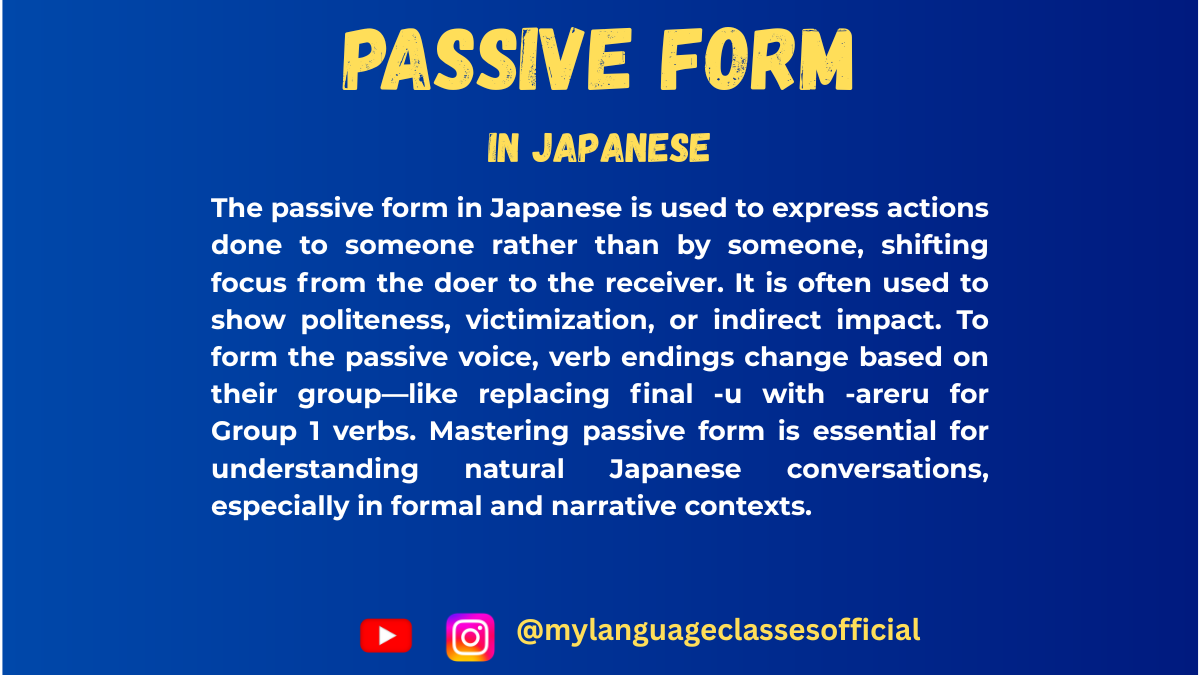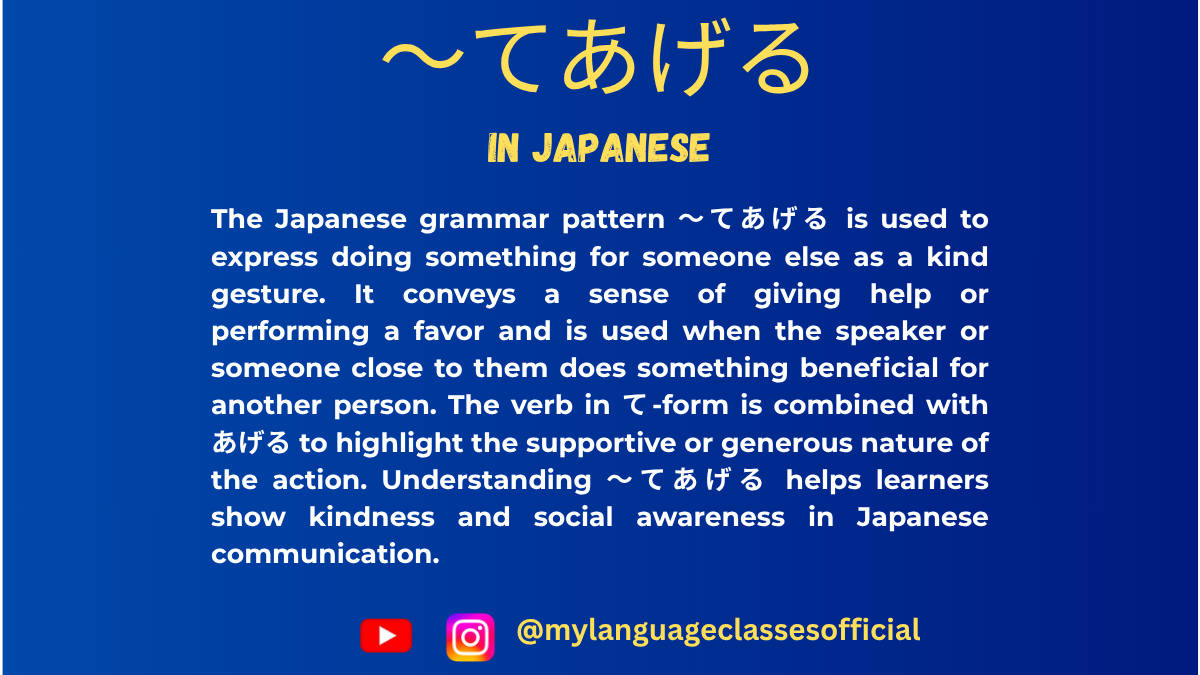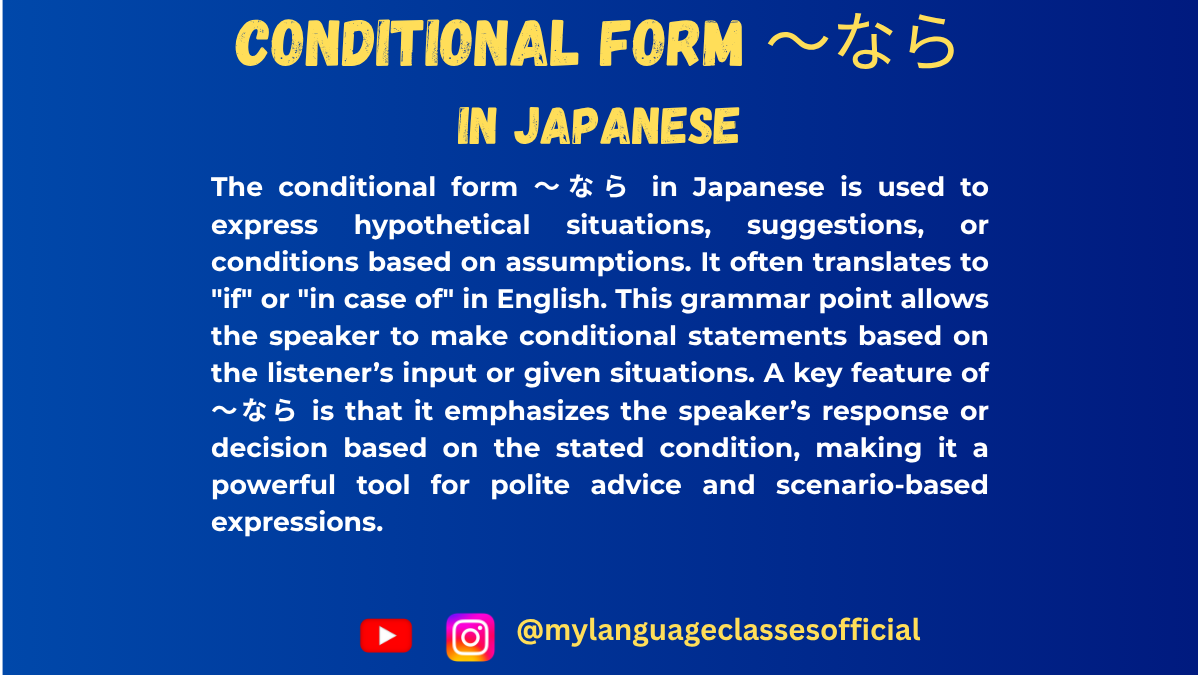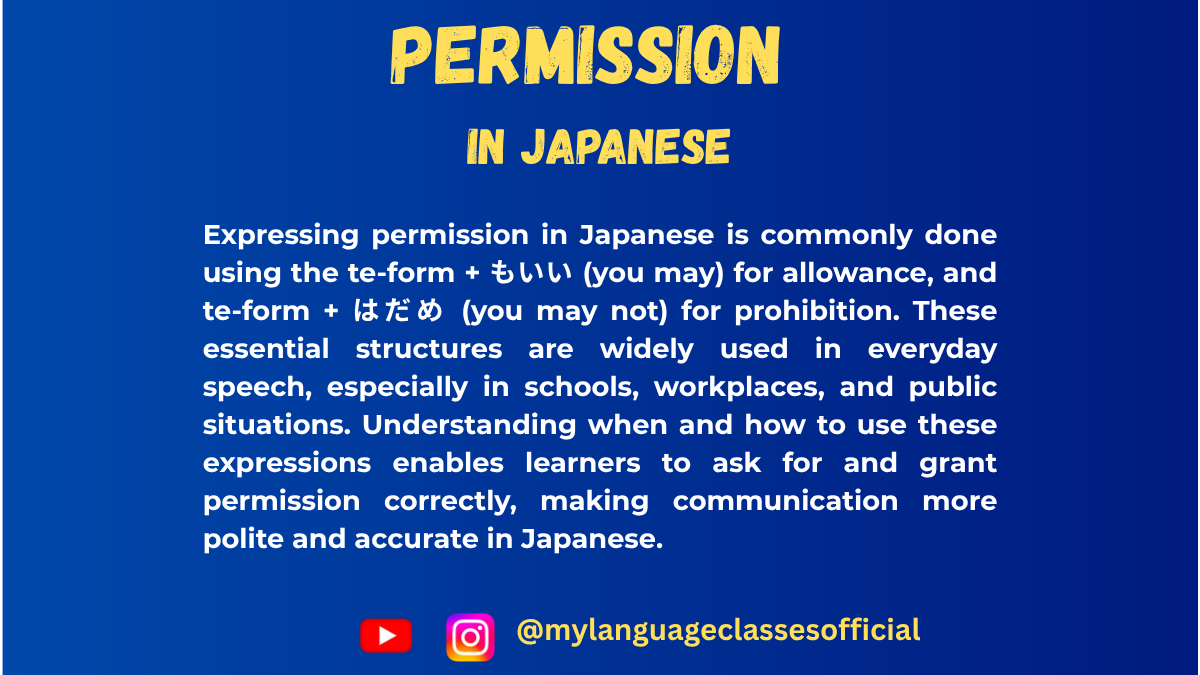Your cart is currently empty!
Tag: beginner Japanese grammar
-

Passive Form of Verbs in Japanese | My Language Classes
Understanding Passive Form in Japanese
The passive form (受身形, うけみけい) in Japanese is used in various situations, primarily to describe actions where the subject is affected by someone else’s actions. Unlike in English, where the passive voice is often avoided, Japanese frequently uses it in daily conversations and formal writing. In this blog post, we will thoroughly explore the formation and usage of passive verbs in different contexts.
Usage of Passive Form in Japanese
The passive form is used in the following situations:
- When someone is negatively affected by an action (被害受身 – ひがいうけみ)
- Japanese: 私は弟にケーキを食べられました。
- Romaji: Watashi wa otōto ni kēki o taberaremashita.
- Meaning: I had my cake eaten by my younger brother.
- When describing an event from the perspective of the affected person
- Japanese: 私は先生にほめられました。
- Romaji: Watashi wa sensei ni homeraremashita.
- Meaning: I was praised by my teacher.
- When discussing historical or public events
- Japanese: このお寺は100年前に建てられました。
- Romaji: Kono otera wa hyaku nen mae ni tateraremashita.
- Meaning: This temple was built 100 years ago.
- When avoiding mentioning the doer explicitly (formal, impersonal expressions)
- Japanese: 日本ではお米が多く食べられています。
- Romaji: Nihon de wa okome ga ōku taberareteimasu.
- Meaning: Rice is widely eaten in Japan.
- When talking about natural phenomena
- Japanese: その山は雪で覆われています。
- Romaji: Sono yama wa yuki de ōwareteimasu.
- Meaning: That mountain is covered with snow.
- In literary or poetic expressions
- Japanese: 彼女の歌は世界中で聞かれています。
- Romaji: Kanojo no uta wa sekaijū de kikareteimasu.
- Meaning: Her songs are heard all over the world.
Formation of Passive Verbs
Japanese verbs are categorized into three groups. The passive form is formed differently for each group.
Group 1 (Ichidan verbs / 一段動詞)
Formation: Drop the final る and add られる
Verb Potential Form Passive Form Example Sentence (Japanese) Romaji Meaning 食べる (たべる) 食べられる 食べられる 私は友達にお菓子を食べられた。 Watashi wa tomodachi ni okashi o taberareta. I had my sweets eaten by a friend. 見る (みる) 見られる 見られる 私の秘密はみんなに見られた。 Watashi no himitsu wa minna ni mirareta. My secret was seen by everyone. 教える (おしえる) 教えられる 教えられる 日本語は先生に教えられた。 Nihongo wa sensei ni oshierareta. Japanese was taught by the teacher. Group 2 (Godan verbs / 五段動詞)
Formation: Change the final u sound to a sound and add れる
Verb Potential Form Passive Form Example Sentence (Japanese) Romaji Meaning 書く (かく) 書ける 書かれる 私の名前が黒板に書かれた。 Watashi no namae ga kokuban ni kakareta. My name was written on the blackboard. 読む (よむ) 読める 読まれる この本は多くの人に読まれた。 Kono hon wa ōku no hito ni yomareta. This book was read by many people. 言う (いう) 言える 言われる 先生に「すごい」と言われた。 Sensei ni “sugoi” to iwareta. I was told “amazing” by the teacher. Group 3 (Irregular verbs / 不規則動詞)
Verb Potential Form Passive Form Example Sentence (Japanese) Romaji Meaning する できる される 彼の仕事は上司に評価された。 Kare no shigoto wa jōshi ni hyōka sareta. His work was evaluated by the boss. 来る (くる) 来られる 来られる 私の家に友達が来られた。 Watashi no ie ni tomodachi ga korareta. A friend came to my house.
More Example Sentences
- 彼は友達にからかわれた。 (Kare wa tomodachi ni karakawareta.) – He was teased by his friends.
- 雨が降って、試合が中止された。 (Ame ga futte, shiai ga chūshi sareta.) – The match was canceled due to rain.
- 私の自転車が盗まれた。 (Watashi no jitensha ga nusumareta.) – My bicycle was stolen.
- その映画は世界中で見られている。 (Sono eiga wa sekaijū de mirareteiru.) – The movie is being watched worldwide.
- 彼は先生に叱られた。 (Kare wa sensei ni shikarareta.) – He was scolded by the teacher.
- この本は多くの人に読まれた。 (Kono hon wa ōku no hito ni yomareta.) – This book was read by many people.
- 先生に質問が聞かれた。 (Sensei ni shitsumon ga kikareta.) – A question was asked by the teacher.
- 日本では魚がよく食べられる。 (Nihon de wa sakana ga yoku taberareru.) – Fish is often eaten in Japan.
- その話は新聞に書かれていた。 (Sono hanashi wa shinbun ni kakareteita.) – That story was written in the newspaper.
- 彼の名前は歴史に残されている。 (Kare no namae wa rekishi ni nokosareteiru.) – His name is left in history.
Fill in the Blanks Exercise:
- 私の名前が黒板に____。
- 先生にほめ____。
- 私は友達にお弁当を____。
- その建物は100年前に____。
- その映画はたくさんの人に____。
- 宿題が____。
- 彼は友達に____。
- その話は新聞に____。
- 日本では魚がよく____。
- 彼の仕事は上司に____。
Answers:
- 書かれた 2. られた 3. 食べられた 4. 建てられた 5. 見られた 6. された 7. からかわれた 8. 書かれた 9. 食べられる 10. 評価された
Things to Keep in Mind
- Passive verbs often imply an indirect effect on the subject.
- Passive form is commonly used in formal writing and polite speech.
- Certain verbs are more frequently used in passive form, such as 言う (to say), 書く (to write), and する (to do).
- When the subject is negatively affected, the nuance of 被害受身 (negative passive) comes into play.
- Passive sentences often omit the doer (agent) for a softer, indirect tone.
Conclusion
Mastering the passive form of verbs in Japanese is crucial for fluency and understanding natural speech patterns. It is widely used in both formal and informal contexts. By practicing passive verb conjugations and understanding their nuanced usage, learners can improve their comprehension and communication skills in Japanese effectively. Keep practicing and using these forms in daily conversation to become more proficient!
If you enjoyed this lesson, be sure to check out more posts like this on my blog at My Language Classes. Don’t forget to subscribe my YouTube channel and follow me on Instagram for the latest language learning tips and lessons. Leave a comment below to share your thoughts, or ask any questions you have about nouns.
Happy learning! 😊
- When someone is negatively affected by an action (被害受身 – ひがいうけみ)
-

How to Use 〜てあげる | My Language Classes
〜てあげる: To Give (an Action) in Japanese
When learning Japanese, you will often encounter the phrase 〜てあげる (te ageru), which means “to give (an action).” This phrase is used when the speaker or someone performs a beneficial action for another person. The nuance of 〜てあげる is that the action is done out of kindness or generosity.
How to Use 〜てあげる
The structure is simple:
[Person] は [Recipient] に [Action in 〜て-form] + あげる
Example:
- わたしは ともだち に 本を 貸してあげました。
(Watashi wa tomodachi ni hon o kashite agemashita.)
→ I lent a book to my friend (as a favor).
Different Forms of 〜てあげる
The verb あげる can be conjugated into different forms to match the politeness level:
Form Usage 〜てあげる Casual/plain form 〜てあげます Polite form 〜てあげて Te-form for requests 〜てあげない Negative form (not doing the action) 〜てあげなかった Past negative form Situations Where 〜てあげる Is Used
1. Doing Something Nice for Someone Else
- わたしは ちょうとせんせい に にもつを 持ってあげました。
(Watashi wa chouto sensei ni nimotsu o motte agemashita.)
→ I carried the teacher’s luggage for them.
2. Helping Someone
- おとうさんは ぼくに 自転車の修理を してあげた。
(Otousan wa boku ni jitensha no shuuri o shite ageta.)
→ Dad fixed my bicycle for me.
3. Giving Advice or Instruction
- わたしは ともだち に 日本語 を 教えてあげる。
(Watashi wa tomodachi ni nihongo o oshiete ageru.)
→ I will teach my friend Japanese.
4. Buying Something for Someone
- おかあさんは いもうと に 花を 買ってあげました。
(Okaasan wa imouto ni hana o katte agemashita.)
→ Mom bought flowers for my little sister.
5. Making a Favorable Gesture
- 私は 友達 に コーヒーを 作ってあげました。
(Watashi wa tomodachi ni koohii o tsukutte agemashita.)
→ I made coffee for my friend.
6. Expressing Kindness in a Relationship
- けんたろうは かのじょに マッサージを かいてあげた。
(Kentaro wa kanojo ni massaaji o kaite ageta.)
→ Kentaro gave his girlfriend a massage.
7. Helping Children or Animals
- おねえさんは 犬 に 食べ物 を あげてあげた。
(Oneesan wa inu ni tabemono o agete ageta.)
→ The older sister gave food to the dog.
Things to Remember About 〜てあげる
- Used when the action is beneficial: You should only use 〜てあげる when the action is helpful or kind.
- Do not use for superiors: Avoid using 〜てあげる when speaking about actions for a superior (e.g., boss, teacher) as it may sound rude. Instead, use 〜てさしあげる.
- Casual tone: This phrase is often used in informal or everyday conversations rather than in formal writing.
Summary Table: When to Use 〜てあげる
Situation Example Helping a friend はさみを 買ってあげた。 (Bought scissors for them.) Teaching someone えいご を 教えてあげる。 (Teach English to them.) Doing a favor 部屋を 掃除してあげる。 (Clean the room for them.) Helping animals 犬 に 飯 を あげてあげる。 (Give food to a dog.) By mastering 〜てあげる, you can express kindness and generosity in Japanese naturally! Practice using it in real conversations to make your speech sound more fluent and native-like.
Do you have any questions about 〜てあげる? Let me know in the comments!
If you enjoyed this lesson, be sure to check out more posts like this on my blog at My Language Classes. Don’t forget to subscribe my YouTube channel and follow me on Instagram for the latest language learning tips and lessons. Leave a comment below to share your thoughts, or ask any questions you have about nouns.
Happy learning! 😊
- わたしは ともだち に 本を 貸してあげました。
-

Using 〜なら for hypothetical situations | My Language Classes
〜なら: Expressing “If” or “As for” in Japanese
In Japanese, 〜なら is a versatile grammar structure often used to express conditionality (“if”) or to provide contextual emphasis (“as for”). This blog post will explore its usage in various contexts and provide a comprehensive list of situations where 〜なら is applicable.
What is 〜なら?
The particle なら is derived from the verb 成る (なる), which means “to become.” In grammar, it functions as a conditional marker or a topic-related particle depending on the context. It is commonly attached to the plain form of verbs, nouns, or adjectives.
Usage of 〜なら
1. Conditional “If”
- Meaning: Expresses a hypothetical or conditional situation.
- Structure:
Clause A (plain form) + なら, Clause B
Clause B often represents the speaker’s judgment, advice, or consequence.
Examples:
- 日本に行くなら、富士山を見たほうがいいですよ。
(Nihon ni iku nara, Fujisan o mita hō ga ii desu yo.)
If you’re going to Japan, you should see Mt. Fuji. - 雨が降るなら、外出しないほうがいいです。
(Ame ga furu nara, gaishutsu shinai hō ga ii desu.)
If it rains, you shouldn’t go out.
2. Topic-Based “As for”
- Meaning: Indicates that a specific topic is being addressed in response to a preceding statement or question.
- Structure:
Noun + なら
Examples:
- 映画なら、コメディが一番好きです。
(Eiga nara, komedi ga ichiban suki desu.)
As for movies, I like comedies the best. - この本なら、もう読んだことがあります。
(Kono hon nara, mō yonda koto ga arimasu.)
As for this book, I’ve already read it.
3. Contrasting Ideas
- Meaning: Suggests a contrast between two different ideas or topics.
- Structure:
Noun/Adjective/Verb + なら
Examples:
- 英語なら話せますが、フランス語は話せません。
(Eigo nara hanasemasu ga, Furansugo wa hanasemasen.)
If it’s English, I can speak it, but I can’t speak French. - 安いなら買いますが、高いなら買いません。
(Yasui nara kaimasu ga, takai nara kaimasen.)
If it’s cheap, I’ll buy it, but if it’s expensive, I won’t.
4. Hypothetical Suggestions
- Meaning: Used when giving suggestions or advice based on hypothetical conditions.
- Structure:
Clause + なら
Examples:
- 東京に行くなら、スカイツリーを訪れるべきです。
(Tōkyō ni iku nara, Sukaitsurī o otozureru beki desu.)
If you’re visiting Tokyo, you should check out the Skytree. - 勉強するなら、早めに始めたほうがいいですよ。
(Benkyō suru nara, hayame ni hajimeta hō ga ii desu yo.)
If you’re going to study, it’s better to start early.
5. Clarifications or Conditions
- Meaning: Used when responding to a condition or clarifying information.
- Structure:
Noun + なら
Examples:
- 山田さんなら、もう帰りましたよ。
(Yamada-san nara, mō kaerimashita yo.)
If you’re talking about Yamada-san, he’s already gone home. - 駅なら、この道をまっすぐ行けば着きます。
(Eki nara, kono michi o massugu ikeba tsukimasu.)
If you mean the station, go straight down this road.
When to Use 〜なら?
Here is a quick checklist of situations where 〜なら is appropriate:
- Making a Hypothetical Conditional Statement:
“If you’re going to X, then Y.” - Responding to Questions or Comments with Context:
“As for X, Y applies.” - Contrasting Two Scenarios or Topics:
“If X is true, Y. But if not, Z.” - Providing Advice Based on Hypothetical Situations:
“If you’re considering X, then Y is a good idea.” - Clarifying or Confirming a Specific Topic:
“If you’re talking about X, then Y.”
Tips for Using 〜なら
- Be Contextual: 〜なら thrives on context. Make sure the listener understands the implied condition or topic.
- Be Specific: Use it to address clear contrasts or hypothetical situations, avoiding vague statements.
- Practice Intonation: When using 〜なら in spoken Japanese, emphasize the conditional tone to make your intent clear.
By mastering 〜なら, you’ll find yourself able to express conditions, offer advice, and clarify topics more effectively in Japanese. Practice by creating your own sentences in real-life scenarios!
If you enjoyed this lesson, be sure to check out more posts like this on my blog at My Language Classes. Don’t forget to subscribe my YouTube channel and follow me on Instagram for the latest language learning tips and lessons. Leave a comment below to share your thoughts, or ask any questions you have about nouns.
Happy learning! 😊

